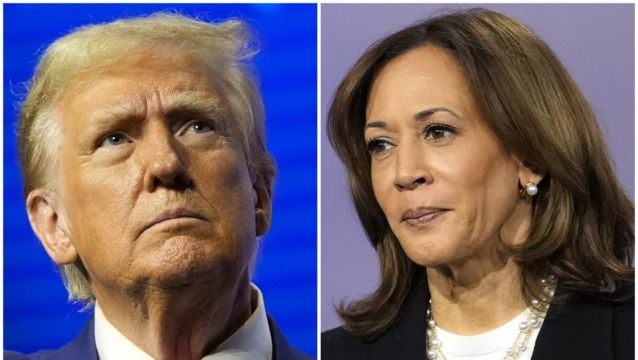Kamala Harris and Donald Trump are both likely to harness a message of fear, but in different ways, in the closing stretch ahead of the US presidential election, according to a political consultant who has made adverts for the likes of Hillary Clinton and Barack Obama.
Dr Laura Barberena is the founder and owner of VIVA Politics, LLC located in San Antonio, Texas. The firm manages political campaigns among other services.
In an interview with BreakingNews.ie, Dr Barberena said: "I think Trump will double down on this type of fascist, fear, rhetoric. He understands his best chance is to get young white, Latino and black men to come out and vote for him, people who don't traditionally vote. He'll lean into the grievance language, the authoritarianism appeals to this demographic.
"The 'enemy within', this language of hypermasculinity, talking about Arnold Palmer's genitalia, this is the wink wink, nudge nudge, locker room, 'I'm the man' rhetoric."
She, too, will tap into a certain amount of fear. Fear of total economic, democratic collapse, I think that's where she's going.
On Ms Harris, she added: "Kamala is closing out her campaign at the Ellipse where Trump delivered the speech before the insurrection, she'll double down on the threat to democracy and fascism. The CNN town hall was a key moment where she was asked if she thought he was a fascist and she said yes.
"She, too, will tap into a certain amount of fear. Fear of total economic, democratic collapse, I think that's where she's going.
"I think the appeal to Republican white women specifically is who they're focusing on. This is why we see Liz Cheney being significant in her campaign now."
Dr Barberena's father is from Mexico, and a lot of her work focuses on the Latino community in the United States.
The Latino vote has been identified as a key demographic for both Mr Trump and Ms Harris ahead of the Tuesday, November 5th, election.
Some analysts have expressed concern that Ms Harris is losing ground with the Latino vote.
However, Dr Barberena said the percentages are largely in line with normal.
"When Hillary lost, she didn't lose the election because of Latinos, she met her mark on the Latino vote. There was some concern that Kamala was not going to be meeting those same metrics as other Democratic nominees had in the past.
"She is well within the bell curve of what we see every election; which is 60 to 65 per cent for the Democrat, and anywhere from 30 to 36 per cent for the Republican.
"That's the natural Latino curve. A lot of the narrative lately has been about how she's losing Latino men.
"We've been doing work targeting Latino men. She is falling a little behind, but overall she is in the normal range. Even if she brings these Latino independents over, it will still be in the normal range, it's not going to push 70 per cent. It will still be within the 63 to 65 per cent range."
For an insight into where the rival campaigns are trying to win votes in the final days, Dr Barberena pointed to adverts the Harris campaign is targeting Latino men with, focusing on the economy, employment and small businesses, or the "opportunity agenda".
Economy and costs
"Economy and costs are still the main issues for Latinos. A lot of Latinos are working class families, minimum wage workers, people working two or three jobs, blue collar workers, so costs and economy are crucial. Childcare and groceries are really important issues for Latino families, so this opportunity agenda she's been putting out; number one, talking about homeownership, especially in these swing states to be able to purchase a home, is becoming out of reach.
"Inflation, Covid, etc, but also there are these conglomerates coming in. They've done this in Nevada, they go and buy homes in bulk and rent them, so these equity companies are putting families in this rental cycle and denying them the chance to buy homes.
"Harris is trying to address that directly. We've seen that where she's talking about giving first-time buyers $20,000 grants. It's not a direct solution, but certainly a direct tactic to help Latino families become homeowners.
"She's also talking about helping people to start businesses. Entrepreneurship is huge for Latinos, they make up a huge amount of small businesses across the country.
"She's also talking about apprenticeships and work force development, which is important too, because you see a lot of Latino working men in minimum wage paying jobs and struggling to get ahead.
"Finally, public safety, she's addressing that. At a town hall recently someone was saying crime was going through the roof. It's not, it's actually been declining, and when someone said that, she asked 'why is it always on the news?' If it bleeds, it leads. People in the US love to hear about crime.
"People feel crime is up, but people feel it is despite the statistical data, and perception is reality."

On worries about crime, Dr Barberena said growing homelessness problems in US cities is an issue voters are concerned about.
"In the focus groups I've been doing, I've seen many of the anxieties around safety surrounding the homeless population. You see far more homeless people on the streets in all the major cities, but particularly California, Arizona and Nevada.
"This increase causes anxieties for people. Seeing groups milling around parks and on streets, she's trying to address these issues."
In contrast, she feels some of Mr Trump's politics could alienate voters.
Trump deportation plan
"Going into the final days, in comparison, Donald Trump is talking about unprecedented mass deportations. That is ludicrous on all sorts of levels and impossible to implement.
"He claims he has nothing to do with Project 2025, but his economic plans include cutting Medicare, Medicaid, and cutting social security tax, which would bankrupt social security.
"These are things Latino families really depend on. I think him suggesting he would cut this hurts him.
"There was also a story in The Atlantic about Trump saying he would pay for a soldier's funeral, and a source told The Atlantic he said '$60,000, it shouldn't cost that much to bury a f****** Mexican'.
"To be fair, her sister has said he was nothing but kind to the family, and Mark Meadows [Trump's former chief of staff] also disputed the story. It's hard to discern what is real and not real. Whether he said it or not, the big thing is we all understand this is something he could have said."
Despite all this, Dr Barberena said new polls she has seen show independent voters in her native Texas veering towards Mr Trump.
Dr Barberena said Ms Harris may have another obstacle, in that some voters are reluctant to accept the idea of a female president.
In a focus group I did for Hillary Clinton, several gentlemen told me they would never vote for her because she is a woman, period.
"I think there is an attraction to authoritarianism and hypermasculinity. I've considered saying this publicly before, I don't like throwing the feminine card down a lot, but I have to say, people aren't talking about this... but Kamala being a woman is difficult for her to overcome with Latino men.
"In a focus group I did for Hillary Clinton, several gentlemen told me they would never vote for her because she is a woman, period.
"It's these deep-rooted, macho, cultural things. There is a gender issue here that I don't think people are talking about.
"When you look at the demographics of her supporters. More Latino women support Kamala, more Latino men support Trump.
"I don't know whether it's sexism, fear, but it's there."
Dr Barberena said Ms Harris has gained ground on Mr Trump in relation to economic issues, a crucial area in which the former president had previously held a strong lead.
Harris gaining ground on economy
"What we're seeing in polling is on the economy, she is neck and neck with Trump right now. Previously she was really trailing there. So if we look at these last few weeks, I think her message on a strong economy is coming through.
"It helps that 23 Nobel Prize-winning economists signed a letter endorsing her. When you have 23 economists of this level, it's a huge endorsement of her economic plans.
"In these final days, when people really begin to pay attention, they may see that Trump's economic plan actually hurts low income families, her plan does the opposite.
"If people start tuning into this message, maybe she can continue to tick upward with those independents or people who are worried about the economy."







